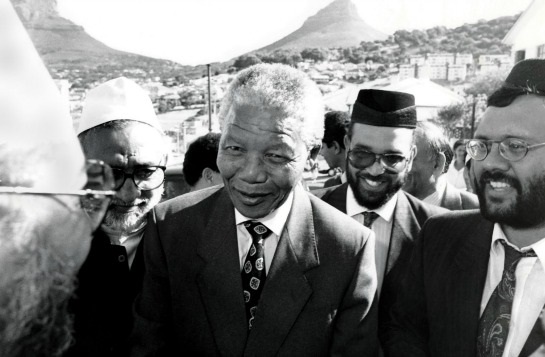The Politics of racial segregation (Apartheid) emerged in South Africa in the early 20th century, i.e. from 1910-1948 when white South Africans implemented a policy of segregation based on racial and skin color. White people assume that their race is higher and also assume that blacks are subordinate races.
The new chapter of Apartheid was in 1948 where Dr. Malan through the South African National Party won the elections and implemented the Apartheid system policy.
It was from this victory then emerged Apartheid political laws which governs the lives of black people in South Africa in all aspects, ranging from politics, economics, social, culture, to education.
The Apartheid politics that run in South Africa lead to reactions and condemnation from domestic and abroad. From within the country, the ANC (African National Congress) appeared, an organization that denounced Apartheid politics. The ANC was formed on 8th January 1912 with the mission of defending human rights and efforts to uphold justice in South Africa.
The ANC organization spawned revolutionary activists who fought against Apartheid politics and opposed every forms of injustice committed by the government against the people of South Africa, one of which was Nelson Mandela, who was incorporated into various actions against the Government (President of South Africa 1994-1999).
The actions of Mandela and other activists (1952-1961) culminated in the arrest of Mandela in 1961. Aside from domestic, politics of apartheid also gained criticism from abroad, such as the Organization of African Unity (OAU) and the United Nations (UN). These two institutions were very heavily involved in giving some assertive action in the form of sanctions and boycotts in order to release South Africa from Apartheid politics. (Ajid Thohir, 2009)
The Role of Muslims in the Struggle against Apartheid Politics
The condemnation of Apartheid politics in South Africa within the country was not only undertaken by the Christians as the majority, but the South African Muslim also played a role in opposing action and the effort of eradicating Apartheid politics in South Africa.
Historically speaking, the origin of Muslims living in South Africa comes from two groups, the first group (1652-1807) Muslims were brought by the Dutch colonialism from East Africa, West Africa, and also Southeast Asia. The Muslims were brought by Dutch to South Africa consisted of slaves, prisoners, and criminals. As for the second group, the Muslims were brought by the British (1860-1914) from India as labor workers who was employed in South Africa.
One of the most prominent Muslim figures in South Africa is Ahmed Kathrada (1929-2017). Kathrada was a South African Muslim from Indian Muslims descendant. He and other activist leaders such as Walter Sisulu, Nelson Mandela, I.C. Meer and J.N. Singh were incorporated into the African National Congress (ANC) who fought various resistance against Apartheid politics. Kathrada even willingly left his studies in college to continue to fight for justice.
Kathrada, in his interview with John Carlin (2015), was known as a brave figure performing various actions and criticism against the government. One of the movements was the Defiance Campaign (1952) or the act of rejection of unfair apartheid laws. Kathrada’s actions were made to his arrestment in 1964 with the other ANC activists including Mandela. Kathrada was sentenced to life imprisonment. In 1989 Kathrada was released when he was 60 years old, he spent 26 years in jail.
Not only Kathrada, in South Africa also born intellectual Muslim students who against Apartheid politics. This was indicated by the establishment of several Muslim student organizations (1970-1980) such as the Muslim Youth Movement (MYM) established in Durban in 1970, and then the Islamic Da’wah Movement of Southern Africa (IDMSA), and the South African Muslim Social Scientists association.
The Muslims involved in such organizations are active in expressing protests Against apartheid political implementation with various demonstration (1980) and through various publications, such as journals, newsletters, and articles whose discussion contains criticism of South Africa’s government policies.
One of the most famous journals of the Muslim Student organization is JAAME Review. The journal contains writings that are written based on the contemplation of Sayyid Qutb of Egypt, Abdul A’la Maududi of Pakistan, and also Ali Shariati of Iran. Those figures are the guidelines for Muslim students to move against oppression.
Aside from student intellectuals, a wide variety of movements against apartheid politics was conducted by a South African conservative Muslim group called Jam’iyyat Al-‘Ulama which supported the ANC and the PAC (Pan African Congress) organization.
From this connection, the ANC supported the Muslims to perform a National Muslim Conference in 1990. In this Conference, delegations from Muslim organizations discussed the political situation in South Africa and also related to religious peace. This meeting succeeded in forming a Muslim Front. At the time of the April 1994 general election, the Muslim Front should recognize the superiority of the ANC that won the South African elections.
Translated from the original article written in bahasa Indonesia: “Kelompok Muslim yang Ikut Menentang Politik Perbedaan Warna Kulit di Afrika Selatan” https://islami.co/kelompok-muslim-yang-ikut-menentang-politik-apartheid-perbedaan-warna-kulit-di-afrika-selatan/, by Adien Tsaqif Wardhana
![Islami[dot]co](https://en.islami.co/wp-content/themes/jambualas/images/logo.png)
